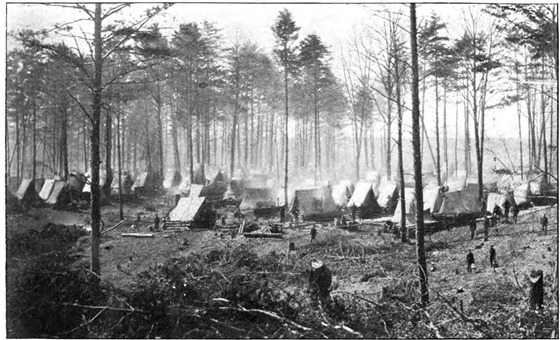Return After A Furlough.
Camp Near Wolf Run Shoals, Va.,
February 7, 1863.[1]
Dear Free Press:
Once more in camp! For your humble servant, after eighteen days’ absence on furlough, the change is from the snows of Vermont to the mud of Virginia; from the peace and comfort of New England homes to the insecurity and desolation of this part of the field of war; from sleeping between sheets and eating at tables and other luxuries of civilization, to tent life and camp fare. For the Twelfth, also, the change within the three weeks past is not a slight one. It has exchanged the broad stretches and open region of Fairfax Court House, for a rough and broken country, wooded with scrub oaks and second growth pines growing on worn out tobacco fields, and scantily peopled with scattered “secesh” farmers. Near us, several hundred feet below the level of our camps, runs the Occoquan river, a muddy stream about as large as the Winooski. Across it, on the heights beyond, are earthworks thrown up by Beauregard’s soldiers last winter, now untenanted.
Our camp is on a knoll from which the men have cleared the pine trees. It is much narrower in its limits than our former fine camp near Fairfax, and it is less attractive in almost every particular.
The first battalion drill since the regiment left Camp Fairfax, came off to-day. The men have had all they could do in digging rifle pits, picket duty, constructing corduroy roads,—of which they have made miles between this and Fairfax Station,—and the labor of clearing and making camp; and between rain and snow and mud have had the roughest time they have as yet known. Their spirits are good, however, and as I write, the music of a guitar and violin and well attuned manly voices, serenading the ladies whose presence in camp I have heretofore mentioned, reaches me on the evening air, and tells of light hearts and good cheer.
Quartermaster Sergeant George H. Bigelow has been appointed first lieutenant in Company B, and detailed as quartermaster of the regiment, and private George I. Hagar, of Company C, has been made sergeant major of the regiment, in place of Sergeant Major Redington, promoted.
 Camp Near Wolf Run Shoals, Va. February, 1863.
Camp Near Wolf Run Shoals, Va. February, 1863.
February 14.
The Twelfth and Thirteenth regiments have here nearly ten miles of picket line to guard. There have been skirmishes between the cavalry outposts, sights of rebel patrols, and rumors of coming attack from rebel cavalry, enough to keep us somewhat on the alert; but the long roll has not sounded, nor has hostile shot been fired by us. Colonel Blunt has been practicing the men at target firing, and they are making sensible progress in the modern method of administering the “blue pills” which are the only cure for rebellion. Yesterday and the day before, fatigue parties crossed the river and destroyed the earthworks on the heights commanding our camps; but while the roads are in their present condition we can hardly be in great danger from rebel artillery. The mud in the roads, where they are not corduroyed, varies from deep to bottomless, and the rains are frequent enough to keep the roads from settling. A week of sunshine, however, would again enable armies to move.
The weather is quite mild. It is raining as I write, with the thermometer at 58°, and the mercury has been as high as 70° in the sunshine in our camp during the past week. The backbone of the winter, if not of the rebellion, is broken in this region. We shall probably not have more than one more right cold spell, and shall henceforth expect much warm weather.
The health of the regiment has improved and may now be called pretty good, though many of us suffer from the disturbing effect of the water, which is not as good here as we have found in our former camps. Company C is called the healthiest company in the regiment.
The Second Vermont brigade is now, as you know, a portion of the Twenty-second Army Corps,—heretofore called the Reserve Corps, Defences of Washington—under command of Major General Heintzleman, and the Twelfth and Thirteenth Vermont are on the outer line of the new “Department of Washington.”
Yours, B.
[1] During the month preceding this date, the writer was promoted to a vacant lieutenancy, and received a furlough for twenty days, to enable him to return to Vermont, whither he was called by his duties as President of the Vermont and Boston Telegraph Co., Postmaster of Burlington, and editor of the Free Press.



